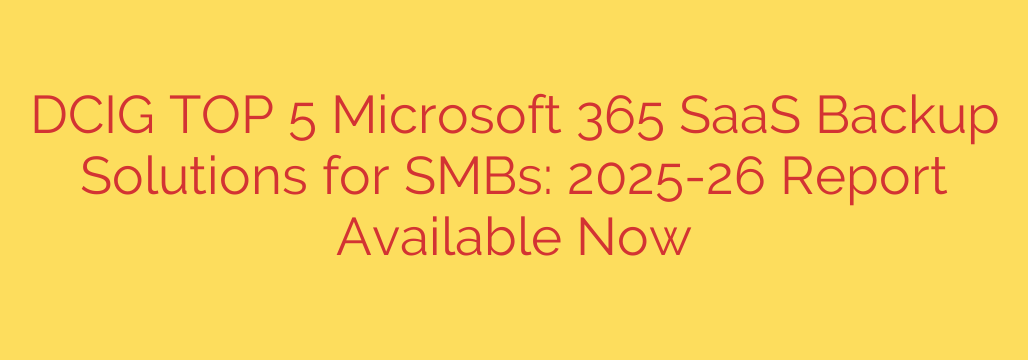
Is Your Microsoft 365 Data Truly Safe? A Guide to Essential Backup Solutions for SMBs
For many small and medium-sized businesses (SMBs), Microsoft 365 is the backbone of daily operations. It powers communication through Exchange and Teams, collaboration in SharePoint, and file storage in OneDrive. With so much critical data hosted in the cloud, a common and dangerous assumption is that Microsoft handles all the necessary backups. This, however, is a critical misunderstanding.
While Microsoft provides a world-class platform with exceptional uptime, the ultimate responsibility for protecting your data lies with you. This is known as the Shared Responsibility Model. Microsoft ensures the cloud infrastructure is running, but it is up to the business to protect its own information from a wide range of common threats. Relying solely on the native retention policies and the Recycle Bin is a high-risk strategy that can lead to permanent data loss.
The Real-World Risks to Your Unprotected M365 Data
Data loss rarely happens because of a major Microsoft service outage. Instead, the threats are often closer to home and far more common than most businesses realize.
- Accidental Deletion: This is the most frequent cause of data loss. An employee might permanently delete a critical file, an important email thread, or even an entire SharePoint site, mistakenly believing it’s no longer needed. The standard M365 Recycle Bin has limitations and is not a true backup solution.
- Ransomware and Malware: Cyberattacks are becoming increasingly sophisticated. A ransomware attack can encrypt your live files, and this encrypted data is then synchronized across the cloud. Without an isolated, off-site backup, you may be unable to recover your information without paying a ransom, which is never guaranteed to work.
- Malicious Insiders: A disgruntled employee could intentionally delete vast amounts of data before leaving the company. Without a third-party backup, recovering this information can be difficult or impossible.
- Compliance and Legal Requirements: Many industries have strict data retention regulations (like HIPAA or GDPR) that require information to be stored securely for years. Microsoft’s default settings are not designed for long-term archival or legal holds, putting your business at risk of non-compliance.
What to Look For: Essential Features of a Microsoft 365 Backup Solution
Choosing the right backup solution is crucial for safeguarding your business. As you evaluate different options, prioritize providers that offer a comprehensive and robust feature set designed for the modern workplace.
1. Comprehensive Service Coverage
Your backup solution must protect the entire Microsoft 365 ecosystem. Look for complete coverage across Exchange Online (mailboxes, calendars, contacts), SharePoint Online, OneDrive for Business, and Microsoft Teams (conversations, files, and metadata). Partial backups leave critical gaps in your defenses.
2. Granular and Point-in-Time Recovery
Disaster recovery isn’t always about restoring an entire system. More often, you’ll need to recover a single lost email, a specific version of a document, or one deleted folder. A top-tier solution offers granular recovery, allowing you to quickly find and restore individual items. Point-in-time recovery is also essential, enabling you to restore data to its exact state before a corruption or ransomware event occurred.
3. Robust Security and Immutability
The security of your backup data is just as important as your live data. Ensure the solution provides strong encryption for data both in transit and at rest. The most critical security feature is data immutability, which means your backups cannot be altered, encrypted, or deleted by ransomware or a malicious actor. This creates an unchangeable copy of your data that guarantees restorability.
4. Ease of Use and Automation
For an SMB, time and resources are limited. The ideal backup solution should be easy to set up, manage, and monitor. Look for an intuitive dashboard, automated daily backups, and proactive alerting that notifies you of any issues. The goal is a “set it and forget it” system that you can trust is working in the background.
5. Transparent Pricing and Scalability
Your backup solution should grow with your business. Seek out providers with clear, predictable pricing models, often based on the number of users or amount of data stored. Avoid solutions with hidden fees for data recovery (egress fees) or other essential services. The ability to easily add or remove licenses is key for a growing SMB.
Beyond Recovery: The Strategic Value of M365 Backup
Investing in a dedicated Microsoft 365 backup solution is more than just an insurance policy against data loss. It is a strategic business decision that:
- Ensures Business Continuity: Minimize downtime and maintain productivity by quickly restoring critical data after any incident.
- Strengthens Your Security Posture: Create an air-gapped, immutable copy of your data that serves as your last line of defense against ransomware.
- Meets Compliance Mandates: Fulfill legal and regulatory data retention requirements with confidence.
- Provides Peace of Mind: Know that your company’s most valuable digital asset—its data—is secure, protected, and always recoverable.
Don’t wait for a data loss event to expose the gaps in your protection strategy. Take proactive steps today to evaluate and implement a dedicated backup solution for your Microsoft 365 environment.
Source: https://dcig.com/2025/09/2025-top-5-microsoft-365-smb-saas-backup/








